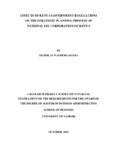| dc.description.abstract | The objective of the study was to establish the effects of Kenya government regulations
on the strategic planning process of oil marketing firms in Kenya with a focus on
National Oil Corporation of Kenya. The research was conducted through a case study.
This study sought to collect both primary and secondary data. The data was obtained in
both oral and written form. Oral data was obtained from interviews based on an
interview guide. There were five interviewees made of senior managers at NOCK
namely; Managing Director, Finance Director, Marketing Director, Operations Director
and the Human Resources Director. The interviewees were selected because they were in
positions of authority and possess key strategic and operational experience on matters
related to the strategic planning process at NOCK. Content analysis technique was used
to analyze the cleaned data. The findings were presented in prose form. The study
established that the government regulations address international safety standards public
hygiene standards in order to provide individual safety to Kenyans, to address investors’
concerns about security-related increase in cost of doing business in Kenya, and to
protect lives and property. the Kenya government safety regulations on business
premises affect the strategy evaluation in that the government controls the evaluation of
the corporations strategic millage, information delivery, technological advancement, new
service/product & client taste and government regulations/laws and political
environment. The government safety regulations on operating procedures affect strategy
formulation by regulating the areas of business focus, controlling the legal compliance
and price controls. The study concludes that Kenya government safety regulations on
business premises affect the following strategic planning processes at NOCK. In
addition, safety regulations, product quality regulations, price ceilings and price floors
affect the following strategic planning processes at NOCK. The study recommends that it
is important to put in place mechanisms for continued review of the legal and policy
frameworks to ensure it is up to date and the industry remains competitive. Further, it is
necessary to adopt a minimalist government intervention approach in oil production and
distribution. The management of NOCK should seek to enhance their operating
efficiency and quality of products or services in order to improve their strategic planning
amid the many government regulations in the sector in which they operate. | |

